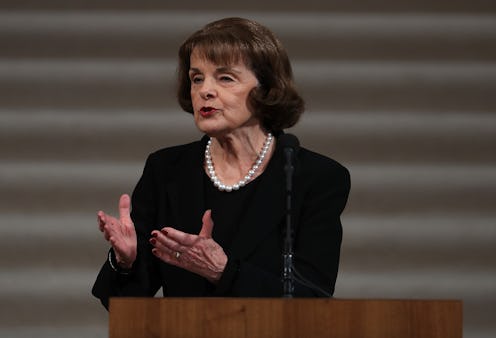News
This Famous Senator Lost The Democratic Party's Support & It Signals A MAJOR Shift

A Democratic stronghold faced opposition from her own party this weekend, when delegates at the California Democratic Convention refused to endorse Sen. Dianne Feinstein's reelection bid. Nominees must receive 60 percent of votes in order to be awarded an endorsement; Feinstein only received only 37.
That being said, the longtime senator is still expected to win come November, according to CNN, which credits her large amount of resources and support from non-party members, like Independents and some Republicans. Feinstein has served in the Senate since 1992.
Feinstein's main intra-party opponent is California State Sen. Kevin de León, who zeroed in on Feinstein's more moderate political viewpoints and actions. He received 54 percent of votes, just shy of the number needed for an endorsement, but still significantly more than Feinstein.
"I'm running for U.S. Senate because the days of Democrats biding our time, biding our talk, are over," De León said in a speech at the convention on Saturday. "Leadership comes from human audacity, not from congressional seniority."
He also called out a comment Feinstein made last August, wherein she reportedly said that President Trump could "be a good president" if "he can learn and change." De León directly mentioned these statements in his message.
"We demand passion, not patience. We speak truth to power, and we've never been fooled into thinking that Donald Trump could be a good president," he said. "California Democrats — we fight on the front lines — we don’t equivocate on the sidelines."
Even if Feinstein is expected to be the victor in November, the race is a microcosm of the state of the Democratic party. Especially since the 2016 election, after a vicious party showdown between Sen. Bernie Sanders and Hillary Clinton, left-leaning voters have been at odds about how best to pursue a liberal agenda. More centrist liberals are generally more open to compromising with their peers across the aisle, even if that means sacrificing certain legislative goals. Those who fall further left consider that approach to be toothless and insincere.
Critics of centrist liberalism might point to an example like the DACA showdown, which has thus far been anticlimactic in nature as congressional Democrats repeatedly leave calls for the protection of undocumented child immigrants on the chopping block. On this issue in particular, NPR reported that Feinstein, who sits on the Senate Appropriations Committee, once said the body would never pass funding for a U.S.-Mexican border wall before promptly voting for a piece of would-be legislation that would do just that. (That legislation did ultimately fail.)
In turn, those Democrats who are determined to steer the party further left tend to believe that there are certain issues which the party cannot afford to, and are morally obligated not to, eschew in favor of simply passing laws and moving forward. They would prioritize labor rights and broad economic equality as essential political priorities. In his Saturday speech, de León characterized himself as one such Democrat.
"Democrats, you'll never have to guess where I stand," he said.
While de León did not win the official party endorsement, earning such a high proportion of the votes will undoubtedly send a message to more traditional establishment Democrats who would otherwise continue to repeat the same talking points which have dominated the party's rhetoric since the 1990s. Those candidates who might have been classified as more fringe have become mainstream regulars, and it appears that Sanders' 2016 campaign was just the beginning.
If there has been one lesson since the 2016 elections, however, it has been that no candidate is a sure thing. While Feinstein is currently the favorite for the November senatorial race, much could change in the upcoming months. With neither Democratic candidate currently enjoying the state Democrats' endorsement, it's far too early to call the race.